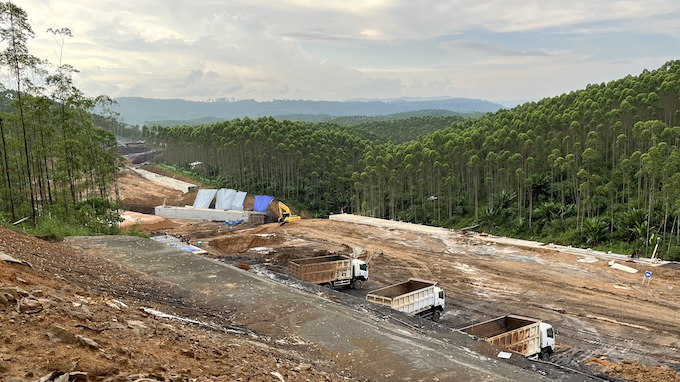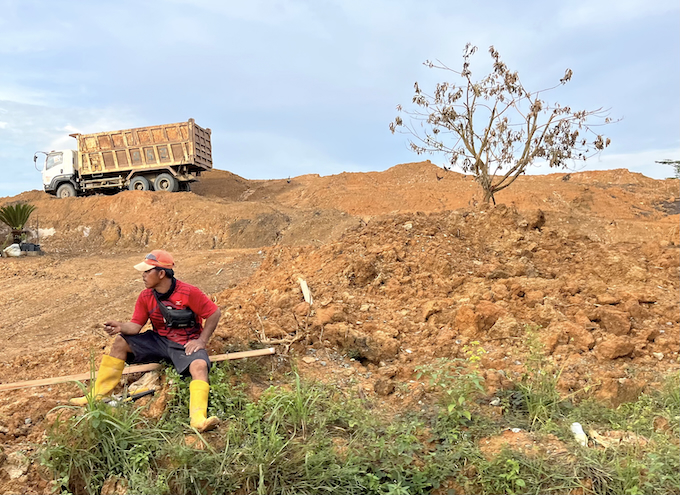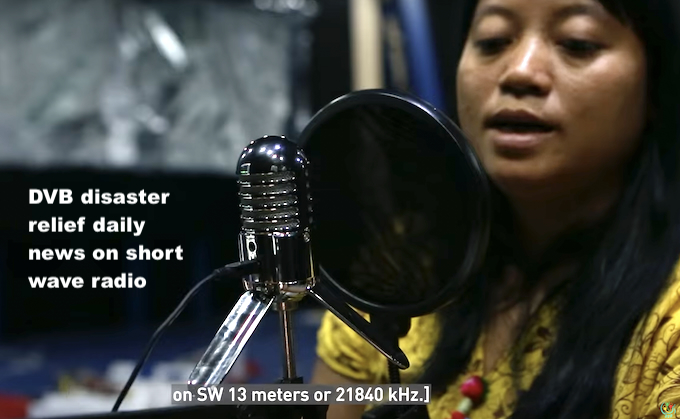
Nusantara, the new capital of Indonesia opens on 17 August 2024, independence day, if everything works out as planned. The plan is to complete it by 2045 - exactly 1 century after the birth of the republic, after 3,5 centuries of Dutch colonial repression. I visited the largest construction site of the nation in East Kalimantan last summer and saw countless trucks slipping and sliding through bright orange mud.
by Ole Chavannes, 15 februari 2024
It's a 4 hour drive between Balikpapan airport and the white spot on the map, soon to be the new capital of Indonesia. When we arrive it is pitch dark. In an empty restaurant only fried chicken Java-style is on the menu. The next morning I wake up by loud noises; a mix of hyperactive birds and low humming sounds. Outside I see a couple of humming bulldozers pushing mud around. At first I'm amazed by the soundtrack of machines and natural music, but the bird twittering turns out to come out of a speaker, hanged next to a rice warehouse; a loop to keep real birds away.
Incorrect clichés
Let me debunk the two most common false assumptions about this new capital. No, Nusantara is not going to replace Jakarta, because that is sinking, as so many media state. The former Batavia, founded by the Dutch in 1619, was already low land - alike the Netherlands. Now the plan is to invest more in protecting Jakarta against the water ($40 billion), than to build the new capital ($35 billion). Jakarta has become a modern metropole, 32 million people in Greater Jakarta call home and it will aim to maintain. For sure the flooding is a complex problem to tackle, but it is another problem, Nusantara is not going to solve.
Jakartans are even not supposed to move all to one of the least populated islands. Nusantara will only be the new administrative capital, hosting 2 million people by 2045, mainly government officers. It is located exactly in the centre of the archipelago of 17,508 islands for a reason; Nusantara stands for sharing power and wealth more evenly among all 280 million Indonesians (https://en.wikipedia.org/wiki/Indonesia), not only Java. Regionally, it’s not far from Kuala Lumpur, Singapore, Bandar Seri Begawan (Brunei) and Manila. Also, it's about the only Indonesian island without active volcanos, earthquakes and tsunami alerts.

No, they don’t cut away unique primary rain forest with orang utangs and horn bills for the ‘Ibu Kota Nusantara’ (translates as ‘mother city of the archipelago’). The area has been a tree plantage for years already with highly flammable eucalyptus trees, harvested every 8 years. One of the ambitious plans for this 100 thousand hectare ‘green capital’ is to replant 15 million trees; 'Original endemic species, to restore the balance of nature' (source: https://en.antaranews.com/news/270213/some-15-million-trees-to-be-planted-in-nusantara-capital-forest).
Resource exhaustion
Of course constructing such a big city in the middle of Borneo is causing wide ecological damage, no matter how green it will eventually be. Despite the beautiful plans for a CO2 neutral and walkable capital, with cool shades under endemic tree leaves, this many people will exhaust natural resources in a large area, demanding water, electricity and roads. Many indigenous people, often referred to as Dayak and Punan complain about loss of natural diversity, poisonous water and insufficient compensation for confiscated land if any. Often these communities can’t proof with some stamped piece of paper, this forest is their home, providing them and their ancestors already for centuries with food, medicine and shelter.
The reason why the ‘green mother capital’ will arise from the forests anyhow, is because of the president-elect last February: Prabowo Subianto (1951) is the current minister of Defence, wealthy businessman and retired honorary army general, who will be inaugurated in October. In 1998 he was discharged from the military and banned from entering the United States until 2020 for allegedly committing human rights abuses under former dictator Suharto.
A local journalist in Balikpapan tells me Prabowo owns most of the land in East Kalimantan already for a long time. The other two presidential candidates were critical about the pricy new capital, but Prabowo has direct interests. This president will do anything to reign from his new green palace. In this video (pitch 1.0) a glimpse of the glass building, shaped as a giant Garuda, Indonesia's national mythical bird >
I only had the opportunity to research the area for a couple of days, but I can’t wait to go back and dig much deeper in this fascinating endeavour. If I succeed, I’ll let you know first on this blog.

Victims of the Mocha cyclone can listen to the Democratic Voice of Burma for the lifesaving news and weather forecast> video.
by Ole Chavannes, 02 juli 2023
DVB aired daily updates with disaster relief news right after the cyclone Mocha hit lowlands of Southwest Myanmar in May 2023, by an international emergency frequency on the short wave. Millions of people were cut off food and electricity for months, as the military junta refused international aid to be brought in.
According to authorities in North Korea there is no Covid-19 in the country. Sang Yong Lee from online newspaper Daily NK knows better: "Due to weak healthcare, we suspect that a large number of people have died from the coronavirus."
Sang Yong Lee is editor-in-chief of Daily NK, part of the 'Unification Media Group'. UMG is a news organisation in Seoul with both North and South Korean journalists, which mainly focuses on informing North Koreans. UMG broadcasts short-wave radio programs to the north on a daily basis and also distributes videos via USB sticks. That Kim Jong-un would have had heart surgery in early April was a world scoop for Daily NK (link).
by Ole Chavannes, 24 juni 2020
This article appeared first in the Dutch quality paper NRC Handelsblad (link). For this blog it has been translated into English.

Editor-in-chief Sang Yong Lee is extremely busy these days. His network of secret informants in North Korea is increasingly reporting on mounting tensions between North and South Korea. Daily NK is one of the few news organisations with its own sources in North Korea. Lee keeps secret how exactly that works. His sources report at risk of their own lives and their families, often using illegal Chinese mobile phones.
North Korean newspapers claim that effective lockdown measures have been taken at an early stage. Do you consider that plausible?
"North Korea closed its borders on January 29, significantly faster than other countries around China. North Korea also refuses to admit 'defectors' arrested in China. With the closed border, the regime wants to demonstrate that there is no corona. However, most experts don't believe this claim.”
How do you estimate the actual Covid-19 impact?
"We have indirect evidence that indicates many deaths from Covid-19. There have been many reports from across the country of deaths after symptoms such as fever and cough. We understand that authorities are ordering to cremate these bodies."
“Hospitals outside Pyongyang have no testing capacity. As a result, local doctors cannot make an accurate diagnosis, but North Korean authorities have said that anyone with symptoms should be placed in isolation. Due to weak healthcare, we suspect that a large number of people have died from the corona virus.”
According to Daily NK estimates, 15,000 people were quarantined and at least 5,000 died, out of a population of approximately 26 million. The UN rapporteur on human rights in North Korea urges the Security Council to ease sanctions to prevent famine. Would that actually benefit North Koreans?
"It are the North Korean authorities who make the people suffer. Even in Pyongyang [where mainly the elite lives - ed.] no rations have been distributed for 3 months. I believe there is an urgent need for humanitarian aid, but sanctions have been imposed to enforce denuclearisation. If they are lifted too quickly, it could be the wrong signal to the regime. Other ways must be developed to help North Koreans.”
The North Korean regime seems to be furious about balloons with 'lies from South Korea'. Is that anger also related to news from for example Daily NK?
"I don't think they are only angry about those anti-Pyongyang leaflets, our reports probably play a part too. In reality, these folders have little chance of bringing about much change, because few copies reach ordinary people. Clearly, the authorities are deeply offended by the content of those leaflets, which explains these threats. It is so sensitive because they are extremely afraid that ordinary North Koreans will learn too much about the regime's weaknesses. That is why we must continue to get even more news into that country.”
Kim Yo-jong, the sister of Kim Jong-un, recently called 'defected' North Koreans 'human waste'. How do escaped North Koreans at Daily NK respond?
"Most of the refugees I speak do think the aggression is abnormal, but they also believe that North Korea is clearly entering a 'provocation cycle' again, because so much is wrong domestically. It is a well-known trick of the North Korean regime to blame and provoke the 'sworn enemy' South Korea to divert attention from the real problems, such as corona and famine now."
How do you analyse the blowing up of the border office and the recent rising tensions?
"There are probably several complex factors involved, but these provocations seem to be primarily aimed at preventing domestic unrest. The pandemic and poverty really make life horrible for ordinary North Koreans. The likelihood of sanctions being eased seems small for the time being, so North Korean leaders are now falling back on the old script; on how to flare-up the conflict with South Korea."
BALLOONS ACROSS THE BORDER ~ Balloon propaganda campaigns have been conducted by both countries since the Korean War (1950). Initially, governments lifted balloons with propaganda brochures, as well as chocolate, tobacco and pornography. Today, it is mainly evangelical and pro-democratic activists who send balloons to break the censorship in North Korea. For example, 'Fighters for a Free North Korea' states that they have released 2 million balloons to date with radios and media about human rights and democracy on DVDs and USB sticks. The effectiveness of balloon campaigns has been the subject of much debate, and there is growing criticism in South Korea as it allegedly would raise tensions between the two countries.
